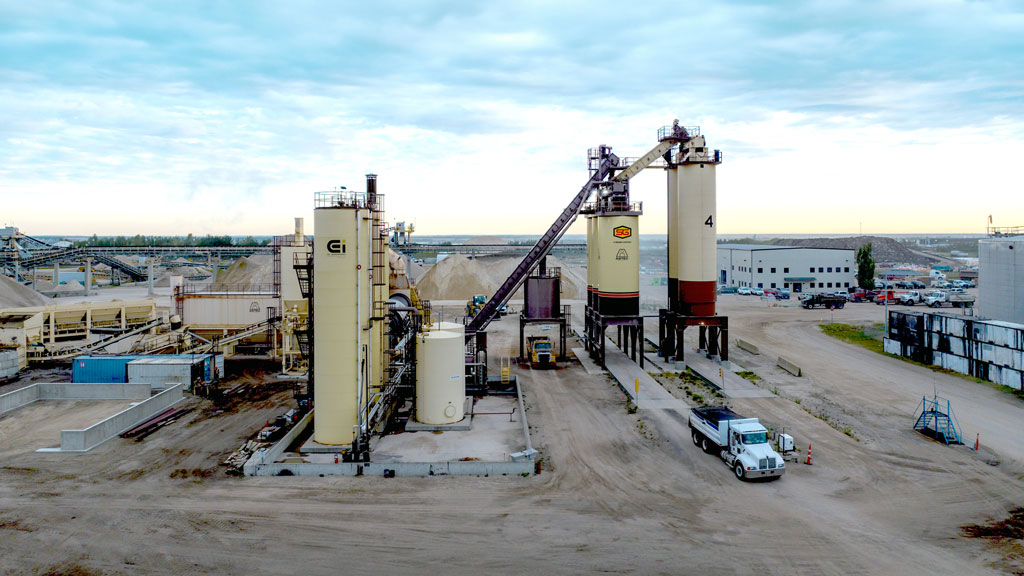Two asphalt concrete producing companies in Alberta and Ontario are leading the charge in their adoption of an environmental initiative designed to measure the “cradle to grave” CO2 emissions generated in asphalt production.
Environmental Product Declarations (EPD) for asphalt mixtures document the various “ingredients” that have gone into the mix design such as aggregate size, the mix design method, the performance grade of the binder and the temperatures used to produce it.
The two companies are Standard General Edmonton and Ontario-based Miller Group.
Miller Group is the first company to offer EPDs in Canada, while Standard Canada was the second, but the first in Western Canada.
Four of Miller’s plants began publishing them in May. They include Bloomington in Richmond Hill, Mosport in Kawartha Lakes, Tapscott in Toronto and the Whitby plant. In July, Standard General’s plant in Acheson, Alta. also started publishing them.
Both are subsidiaries of Colas Canada which, in August 2023, finalized negotiations with the National Asphalt Pavement Association (NAPA) in the United States and its life cycle assessment consultant WAP Sustainability, for the exclusive use of NAPA’s Emerald Eco-Label software tool.
The exclusivity agreement is for a limited time period, says Colas technical director Jean-Martin Croteau.
EPDs are like the nutrition facts found on food labels, which give a full, impartial, third-party verified report on the environmental, cradle-to-grave impact on the specific product produced at a particular plant, says Croteau.
Their purpose is twofold: They help owners and contractors assess an asphalt mixture product from an environmental perspective, allowing them to make informed decisions regarding the impact of that mix on a project.
On the other hand, the information contained in the EPDs helps asphalt manufacturers benchmark their products and continue to strive to find solutions to reduce their environmental impact, he says.
There are a number of ways owners can access the EPD information, including going on the NAPA website or contacting the companies directly. By simply clicking on the EPD tab, viewers can review the elements or components that went into creating the asphalt mix, he says.
“It (the eco-label) is somewhat like an estimating software application,” says Croteau, who notes a number of safeguards have been put into the application so that unverified or misleading information will be rejected.
While some training and education will be required for plant operators to successfully operate the tool, they already have the operational data and information they will be entering into the application, he says.
“We paid for the software to be adapted to Canada,” says Croteau on the negotiations with NAPA, which led to the agreement.
The Washington-based association represents the interests of asphalt producers and contractors, but no such similar national organization exists in Canada. Currently, there no requirements in Canada that EPDs be used, but he believes that will be the case at some point.
In Ontario, the association that represents asphalt producers/contractors is working on a broad-based environmental initiative that would include, but would not simply be restricted, to EPDs.
The Ontario Road Builders’ Association/Ontario Asphalt Pavement Council has been in long-term discussions with the National Research Council Canada (NRC) on a joint program designed to lower greenhouse gas emissions, enhance competitiveness through environmental performance transparency and provide harmonized, quality Life Cycle Assessment (LCA) and Life Cycle Inventory (LCI) data, says ORBA/OAPC technical director Doubra Ambaiowei.
Some of the program objectives would include collecting, reviewing and updating LCI data. Basically, this data would be a “straight-forward accounting” of everything involved in the manufacturing of a product which, in this case, would be asphalt, he explains.
Project consultant WAP Sustainability would be responsible for collecting and analyzing data from participating asphalt production facilities whose identities would be protected. The data would be reviewed by WAP, ORBA/OAPC and the NRC, says Ambaiowei.
The project should get underway in the fall after a contract with the NRC has been completed. More detailed information on the project will be a major highlight of OAPC’s annual fall seminar on Nov. 28, he says.




Recent Comments
comments for this post are closed